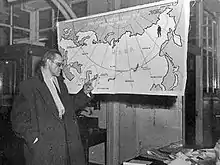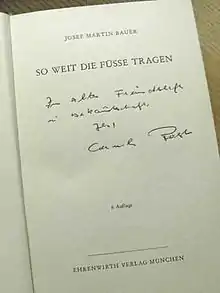Cornelius Rost
Cornelius Rost (27 March 1919, Kufstein, Austria – 18 October 1983, Munich, Germany)[1][2][3] was an Austrian drafted into the German army World War II soldier who allegedly escaped from a Soviet Gulag camp in Chukchi Peninsula, Siberia. His supposed experiences were the basis for a book, a television series, and a film.
Cornelius Rost | |
|---|---|
 Rost at a London press conference in 1958 | |
| Born | 27 March 1919 |
| Died | 18 October 1983 (aged 64) Munich, Bavaria, West Germany |
| Occupation | Printer |
Life
Rost was born on 27 March 1919 in Kufstein, Tyrol, Austria. He was living in Munich when the Second World War broke out, and during the war, he was captured by the Soviet Army. By his own statement, made in 1942, he held the rank of private, although Clemens Forell, his alias in his novel, was depicted as a Wehrmacht officer.
According to the Munich registration office, Rost returned from war imprisonment in Russia on 28 October 1947. In 1953, he started working in the in-house printing division of the Franz Ehrenwirth publishing house in Munich. After ruining numerous book covers, Rost said that he had been made color blind by being imprisoned in Soviet lead mines. Seeking an explanation, Ehrenwirth learned of Rost's supposed prisoner of war experiences. Sensing a good story, Ehrenwirth asked Rost to write down his recollections. Rost's script was of very poor quality, but Ehrenwirth was keen on the story and hired professional writer Josef Martin Bauer to get the material into shape.[4]
Book

Fearing a possible backlash by the post-war Allied authorities, Rost agreed to an oral interview only after being granted the use of the alias Clemens Forell. Bauer then processed the eight hours of taped material into his famous 1955 novel So weit die Füße tragen (As far as my feet will carry me).
In the 1960s, Rost used some of his recollections in his own paperback, Unternehmen Konterbande (Mission Contraband), but it was never printed or published.[5] Bauer’s novel, however, was translated into at least 15 languages and is still being re-published.[6]
Death
Rost died on 18 October 1983 and was interred at Munich's Central Cemetery.[3]
True identity
Almost 20 years after Rost's death, Ehrenwirth's son Martin revealed Rost's true identity to radio journalist Arthur Dittlmann, who researched the life of Bauer for a radio feature-documentary for the author's 100th birthday anniversary.[7]
Doubts of the authenticity of Rost's claims
Comprehensive researches, condensed in 2010 into a three-hour radio feature by radio journalist Arthur Dittlmann for the Bayerischer Rundfunk,[8] left apparently fatal doubts about the authenticity of the events told in Rost's original story. For example, no prisoner of war camp existed at Cape Dezhnev in the Far East of Siberia at the time claimed in the book; Rost was not a Wehrmacht officer as depicted in the story; the German Red Cross, with headquarters in Munich, never received any inquiry about his whereabouts, which is unusual for a ten-year imprisonment; and Rost had been released from a Soviet prisoner of war camp on 28 October 1947, about two years before his alleged escape in 1949–1952, which he therefore could not have accomplished. As a result of this research, within Germany the book is now dismissed as a fraud.[9] Additional errors include Rost naming the main street in Moscow along which he and his captured comrades were driven at the beginning of the novel as the Nevsky Prospekt, a street which is actually located in Saint Petersburg. Apparently Bauer, as the author of the book, failed to cross-check such unreliable, easily verifiable, details in Rost's story.[9]
Adaptations
In 1959, Rost's story was the subject of a six-part television adaption, starring the German character actor Heinz Weiss. When it was first aired, it quickly became Germany's first television blockbuster. In 2001, it was remade as the film As Far as My Feet Will Carry Me, starring Bernhard Bettermann as Forell. Added to the story was a duel between Forell and a Soviet officer who was chasing him, ending in a showdown on a bridge on the Soviet-Iranian border. Many scenes feature characters speaking Russian and other foreign languages, without any subtitles; the intention was to convey to German and other non-Russian viewers the feeling of helplessness experienced by the protagonist with his limited knowledge of Russian.
References
- Die Odyssee des Clemens F. Archived 29 September 2011 at the Wayback Machine (in German) Kölnische Rundschau, published: 27 January 2009, accessed: 21 December 2011
- Falsche Nachkriegserinnerungen – Der Schnee von gestern (in German) Sueddeutsche Zeitung, published: 23 March 2010, accessed: 21 December 2011
- a short biography with a small image of his gravestone. Accessed 23 December 2011.
- (Suddeutsche Zeitung – Online), accessed: 23 December 2011
- "Archived copy". Archived from the original on 20 October 2010. Retrieved 23 December 2011.CS1 maint: archived copy as title (link) (Section Unbekantes Manuskript/Unknown script), accessed: 23 December 2011
- (Amazon.de – latest edition as of March, 2011.), accessed: 23 December 2011
- (Sueddeutsche Zeitung – Online), accessed: 23 December 2011
- Arthur Dittlmann (23 March 2010). "False war-recollections..." Sueddeutsche Zeitung. Retrieved 23 December 2011.
- "As far as your feet will carry you – A global hit – Fiction and Truth (A four-tape-interview as the basis for the novel)". Bayerischer Rundfunk (Bavarian Broadcasting Company). 23 March 2010. Archived from the original on 20 October 2010. Retrieved 23 December 2011.